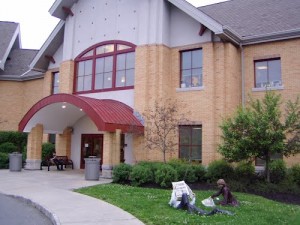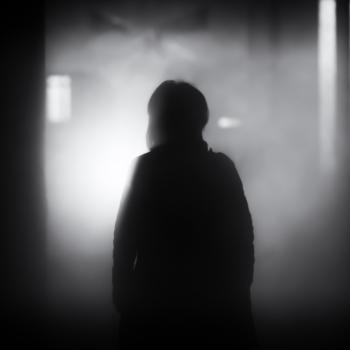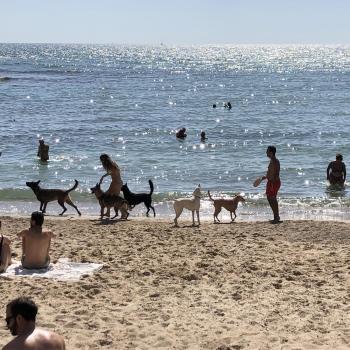 Here I am. Out of place. The computer terminal asks for my borrower’s card ID. I don’t have a borrower’s card for this library: Cherry Hill Public Library.
Here I am. Out of place. The computer terminal asks for my borrower’s card ID. I don’t have a borrower’s card for this library: Cherry Hill Public Library.
Once, I did. But it’s gone now, burned in a fire at my parents’ house decades ago, or packed in some unlabeled box on a shelf in the furnace room of my house in Asheville.
Here I am: in the library of my youth. Here, in my first years of discovering poetry, I scanned the 800s, slid The Poetry and Prose of William Blake from its place, considered its heft, added the title to the eternal list of books to read one day, one day outside of time, and restored it unopened to its exact location in Dewey’s rational universe.
Blake: the poet’s name, burning darkly, claimed its place in the personal cosmos I was beginning to populate, its place among names (and works) of other writers, musicians, artists I claimed as my own: Kafka, Buckley (Tim), Rauschenberg, Fripp.
When I was nameless, these names that called to me and that I drew near set me apart from my peers, secured my place among my peers.
Names, too, of places to which I had travelled and longed to travel: the Wedge, Newport Beach; the Electric Factory; The Troubadour; Greenwich Village; Santa Cruz. Places where I had seen a show—The Chambers Brothers, The Who—places I watched body surfers risk being crushed by waves, slept in the campus woods, wandered legendary streets.
Away, away from there, away from Cherry Hill: that’s where I longed to live, where I lived.
(One late afternoon, hitchhiking home from high school, a man driving a Volvo picked me up. When the driver, shortly before he pulled onto the shoulder of the road to drop me off, moved his hand from the stick-shift and covered my hand with his, I discovered a place away from Cherry Hill within Cherry Hill. Thanks, I might have said, if I said anything at all, for the ride as I softly closed the door.)
When I was inchoate, surrounded by emergent, potent intellectual, artistic, and sexual performances of my peers, my names, (Randy Newman, Sunset Boulevard) protected me and gave me space, spaciousness (Pine Barrens, Big Sur), when I most needed it, say in a concert crowd pressed close to Denise. Trembling, trapped by the unspoken limits of our friendship, I was permitted only this intoxicatingly close crowd-contact of my body and hers.
Here I am. “I live by the river / And I hide my house away.” (I am with you, Tim Buckley.)
And here I am. “City faces haunt the places where I roam alone.” (I am with you, Randy Newman).
Now, I am here: ten thousand fleeting sorrows, pleasures, fears, ecstasies from where I was then. Here alone with the enduring, reliable worry that accompanies me everywhere.
What, me worry? Worry me home.
Home: The Cherry Hill Public Library, late 1960s to mid 70s. Designed by architect Malcolm Wells, one of the pioneers of earth-sheltered architecture, the Cherry Hill Library I knew included a concrete bunker basement, where the cataloguing and administrative offices were located. There, too, was the periodical room where I read Poetry.
Sheltered, entombed, I might have read this poem by David Ignatow in the September 1972 issue:
“Here I Am”
The radio said, Go to your shelters,
in such a low whisper that we stood there
in front of the set, not wanting to understand
it was not part of a play. The color of the blast
came high over the horizon. We stood watching,
still unable to make up our minds
that we were being killed for real.
We ran and are still running, it seems
though our bodies have long since dropped
from us. We could be the wind
rushing through the trees or the stars
moving out to the perimeter. We know
we felt ourselves vanishing in flame and wind
and it seemed we were becoming either one
or both.
How then do we speak to you
without body or voice? Do you know
there is this other world, very silent,
which penetrates yours? Without your knowledge
or your feeling it you hear
every word I speak but do not see or feel me
anywhere at all. I have no sight or touch
of you but I speak because I am
from nowhere in particular. And now
can you tell me what it is to live
in the change, without trees or grass or houses?
I know you exist, you make curious impingements
upon my speech as it surrounds and penetrates
your body.
Might have read it, but probably didn’t. Yet here it is, right where I didn’t leave it, on the Poetry Foundation website, among all the issues, back to 1912, of Poetry, illuminated on my university-issue Dell laptop computer, its fan humming softly, thunder rolling through Beaverdam Valley outside my study. Yes, here I am: home.
Home: the old Cherry Hill Library building, not the building opened in 2004 where, visiting for the first time since it opened, I wrote, “Here I am. Out of place.”
And how shall I answer if it should come to pass, as it came to pass in the life of Abraham, that God calls my name? Will it be written, God said to him, “Richard,” and he answered, “Here I am”?
Could I answer so simply, so definitively, or would I equivocate? I am here and there, now and then and later.
Or shall I answer thus: here, present?
Here I am. Don’t you see me?















